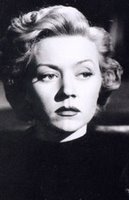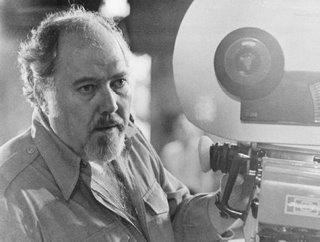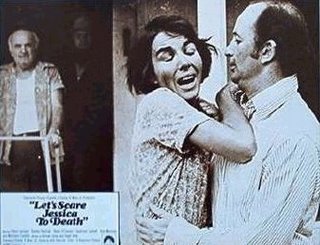
(I know it's November 1, but the Roundup is--OK, has become--atemporal; I have a good dozen or so movies to cover before I can wave those bony fingers and bid a cackling "Bye-bye, kiddies!" to Halloween. Besides--and as usual with this Humble Viewer--such mundane details interfere with the flickering rush of one movie after another, unhindered by the labor of marking time. So let us speak no more of it.)
Twenty seconds into
Let's Scare Jessica to Death (1971) and I remembered--what? Not that I'd seen it before; another five minutes and I was pretty sure I hadn't--although already it's happening again, a strange cinema
deja vu: I choose a movie I'm not sure I've seen before; I watch it, assuring myself I haven't; I think about it afterward--or (and this works even better) start writing about it--and the feeling slips along my forehead, like a trailing damp breeze, that I
have seen it before. It's happening right now, as I think about the opening shot, the canoe in the water, Jessica's voice-over wondering if it all really happened or is she mad and was it a dream, and so on. And the rest of the movie is a flashback, returning at the end to the canoe; so is
that the moment of
deja vu, simply seeing the scene twice? Or does it trigger a real memory? Or is it simply reminiscent of other horror films I've seen that feature a small boat in the water, from
Friday the 13th to
Humanoids from the Deep (both 1980)? Persistence of vision, the notion that the eye is fooled into seeing a series of still pictures as a single moving one, has been pretty thoroughly dismissed as a way of describing how movies are processed by the brain; but it remains an apt phrase for this refusal growing within myself over the past few years to tell one movie from another. Of course, I can still make such differentiations--but not at the level of memory, not after seeing it. So while I hope I will never confuse the three films I've mentioned so far, I know they have confused themselves in me, so to speak, these simply filmed observations of a simple thing: A woman sits in a rowboat while the bad moment waits to happen. So maybe I remember the movie only now; or maybe I've never seen it before, but watching it means I now
have seen it, at least this one time (whatever could be, I wonder, the right verb tense for such uncertainty?); and so, at this stage in a life of movies, it at long last becomes one I've seen before, and gets to sidle up and insinuate itself into other films. The vision that persists, then, is not that I
have seen every movie, but that I want to
remember having seen them all. As Joseph and Barbara Anderson put it in
"The Myth of Persistence of Vision Revisited" (1993), "we process movement in active meaning-seeking ways." This is, at least, how I process, if not movement, then at least movies: actively, seeking meaning (or at least recognition)--but also passively, succumbing to the myth/vision that every movie persists, somewhere. Well, I have silenced myself with this; better to just keep watching, and let them all be repeat viewings.
But what I do know I saw was Jessica herself, played by Zohra Lampert, an actor I immediately recalled--better yet, a face, a form, a set of mannerisms that never went away, not since I first saw them on some TV show or other. I checked the IMDb, and she was on TV a lot, in episodes of
Route 66,
The Defenders,
The Alfred Hitchcock Hour,
Dr. Kildare,
The Man from U.N.C.L.E.,
I Spy,
The Bob Newhart Show,
Kojak,
Hawaii Five-0, plus appearances in various movies. A face that invites
deja vu if only because it must've darted and shimmered across my line of sight for a decade or so as I consumed TV with foolish nonchalance; after all, it was on.
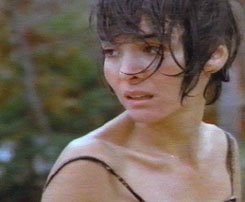
Zohra Lampert, though, was no mere who-
was-that bit player, a lost '70s face in the crowd. No, if you saw her at all, she stayed with you, if only because, as even my son noticed, you cannot read her. She seemed perpetually undecided whether the world was laughing
with or
at her, whether she wanted to grin or flinch, stay or go. She was like some kind of gangly land-bird just about ready to dart off. In some ways, playing in
Let's Scare Jessica to Death a recovering head-case with a chuck-it-all-and-start-a-farm husband (with a remarkably sideburned friend in tow), Lampert found a perfect role: She really did look crazy, and maybe was, in an effectively indeterminate way. She made Jessica seem trapped in a particularly damaging emotional-memory exercise, star pupil of an unbalanced acting coach who didn't care how much harm all this stress was doing her; so Jessica herself didn't seem to know exactly where things were or who she could trust or whether the small-town vampires were real or, like everything else increasingly seemed, figments of a constructed imagination.
In other words, I couldn't stop watching her. For ninety nervous minutes, Lampert captured the essence of that first nameless sap who gets it just so we can glimpse the monster--except Lampert is forced to hang on, to walk the dark corridor the whole way, to creep along the hedge for an hour-and-a-half, to listen at the too-thin door far too long. And in her hands the effect is not unrelenting suspense, but exhausting explication of victimhood. But don't get me wrong: Lampert is no limp rag wrung in the anxious hands of whatever and blah-blah-blah (to tell you the truth, every once in a while even
I get tired of writing like me), but a performance artist, if I may mix metaphors (or occupations), turning toward the viewer a self-conscious eye, a direct request that the audience watch her acting. It was fun but disconcerting, a true tall tale about horror's fractal pattern, lightning clawed across the sky, cliched but still making you jump. And at the very end, as Jessica slumps suddenly below the gunnels, she has been so indecipherable that all we can do is refer to the title to make sure what has happened: that they have indeed scared Jessica to death, something that, as I look back on the film--suddenly remembering it--Lampert had been insisting all along.
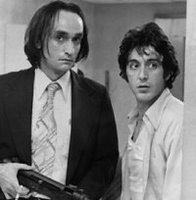
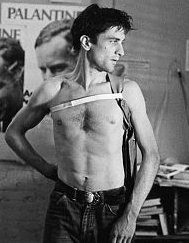 Robert DeNiro
Robert DeNiro 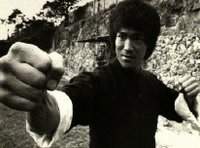 Bruce Lee
Bruce Lee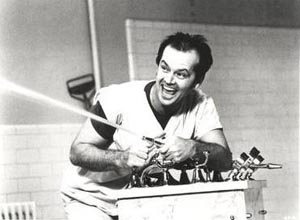 Jack Nicholson
Jack Nicholson 
